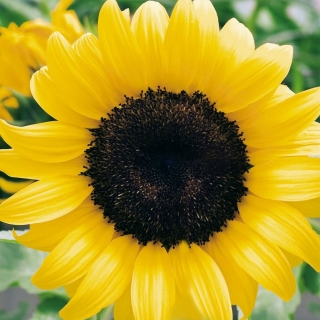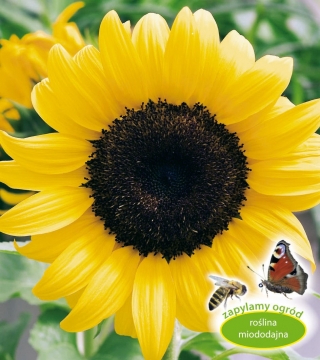The tall single-flowered ornamental sunflower is a plant that everybody will quickly recognize. Its large flat characteristically coloured flowers are considered the personification of joy and optimism. This large annual plant constitutes a wonderful garden decoration. It looks great as cover for walls and less attractive garden parts. Cheerful sunflower flowers are perfect for planting in rows alongside fences, driveways, gazebos, and in the background of flower beds. Apart from their undisputed ornamental features, sunflowers belong to melliferous plants. Their pleasant honey scent and large flowers attract bees and butterflies.
A sunflower inflorescence is built similarly to other flowers of the Aster family. The middle of the flower is filled with brown disc flowers. The outer edge consists of yellow ray flowers that are commonly called petals. The contrast between two flower types is strong, yet very eye-pleasing.
Presented ornamental sunflower grows up to 160 centimetres tall. It starts to bloom in July to end in early autumn. It requires a well lit, warm site that is also sheltered from wind. Sunflower seeds should be sown directly onto beds in April and May. We recommend to sow pointwise, three seeds per hole. Leave the strongest seedling after the germination. Keep the tall varieties 50 x 75 centimetres apart. Sunflowers need a fertile, moderately moist, nutrient-rich soil in order to grow and develop well. You can feed them with multicomponent fertilizers with micronutrients as soon as they have developed two pairs of true leaves.
The offer is valid for a 2 gram package of tall single-flowered ornamental sunflower seeds. Basic plant growing instructions and the sow-by date are printed on the package.
- Height: 160 centimetres
- Use: ornamental; melliferous
- Flowering period: July - September
- Growth form: tall, erect
- Flower colour: brown and yellow
- Vegetation form: annual
- Flower type: large, flat
- Site: sunny, warm, sheltered; fertile, moderately moist, nutrient-rich soil
- Weight: 2 g
GardenSeedsMarket - has been in business for more than a decade and from the very beginning we have made the quality of our products the top priority. Throughout the years we have delivered the best quality goods to tens of thousands of customers from all over the world. Their satisfaction proves that we had chosen the right way.
All seeds we sell are subject to a multi-level quality control checks and only then are carefully packed and dispatched. Our products have been awarded numerous certificates and comply with the highest standards of the European Union. Our employees are experienced gardeners who are more than happy to answer your every question.
Where do our seeds come from?
All of the seeds sold in our shop come from the best producers from across the European Union. Thanks to a long-standing cooperation with them we were able to develop the most adequate storing and dispatch conditions, guaranteeing that you always receive fresh and carefully tested batches of seeds. Exclusion of the middlemen from the whole process not only makes it possible for us to avoid sending out-of-date seeds that might have been lying too long on a warehouse shelf, but also ensures the most attractive price for top quality products.
The quality control process
All our seeds must pass a four-stage quality control process.
Stage one begins with a careful selection of the suppliers. Than we proceed with controlling their crops, foreign producers are not excluded from the quality control process. Plants are checked at every stage of their development: when they start to grow, during blooming and when they start bearing fruit (seeds). At this stage the most important thing is to ensure proper spacing of the plants. Thanks to that obtaining the desired morphological characteristics of each particular species or variety, such as colour, height and shape, can be ensured.
Stage two consists of a detailed verification tests in laboratory conditions. With the use of the highest quality equipment by the highly qualified staff, our suppliers perform more than 30 000 quality checks annually. The seeds that do not meet our requirements are subject to technological refining processes, including drying, cleaning, upgrading and testing again.
Stage three starts with sowing seeds in selected control plots. That way we obtain valuable, exact information concerning their germination that must be maintained at an appropriate level. Simultaneously, the varietal identity of each species is checked at this stage.
Stage four takes place in our warehouses and consists of eliminating seeds that have been stored for too long on our shelves and replacing them with new batches. Each package is stamped with a unique batch number and also with the sow-by-date.
All four stages combined allow us to state with confidence that the seeds we deliver comply with the highest standards and have completed all required control stages with flying colours.
Prizes and awards
The seeds we sell are widely recognized for their quality and have won many awards. Our seeds won numerous gold medals and distinctions for their high quality. The World of Flowers was also honoured for its innovative approach.
Among those awards there were: TOP INNOVATION (June 2015), GOLD MEDAL AT THE POZNAN INTERNATIONAL FAIR (2015), CONSUMER QUALITY LEADER (2014), FARMER OF THE YEAR (2014).
In addition, we have also been awarded the “IDEAL BUSINESS” certificate for two years in a row.
Germination
We are committed to selling only the highest quality seeds. Taking into consideration the efforts we make daily, please also note that plants are living organisms and their germination and growth depends on many factors, such as temperature, soil type, humidity and the frequency with that they are watered, sowing time and conditions, use of fertilizers and plant protection agents (pesticides), as well as weather and climate conditions. We provide help by sharing the accurate and up-to-date sowing and growing information, however, we cannot bear any responsibility for the plants that were not cultivated in conditions appropriate for given species.







